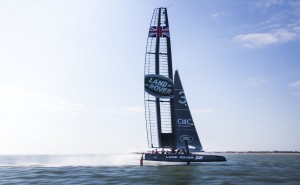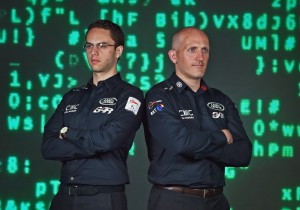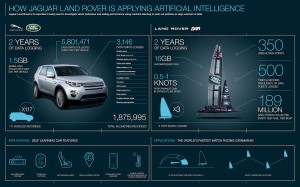
A Land Rover team of engineers is helping the Land Rover BAR team make its America's Cup entry faster.
America’s Cup is the pinnacle of sailing competitiveness. Teams spend upwards of $100 million just to sniff success and rumor has it Oracle Team USA owner Larry Ellison blew past that by nearly double when his team won it in 2013.
However, in an attempt to bring the Cup to Great Britain for the first time ever, one team is looking not to outspend its opponents, but to outthink them. The Land Rover BAR team is using the brains from one of its sponsors – Land Rover – to build a faster boat … faster because it’s smarter.
The team borrowed a group of Land Rover engineers for more than a year so they could use artificial intelligence to find patterns in the boat’s performance data, which could be used to make it go faster.
The concept isn’t all that novel. Formula 1 and other racing teams have been using this type of data for years in the quest for speed. However, where it gets creative is that sailing is missing an important piece of information critical to racing: calibrated horsepower.
Unlike a car, a boat’s power source – wind – is tough gauge because it’s constantly changing, noted Richard Hopkirk, Land Rover BAR head of systems and analysts. So the boat, which collects enough data to fill an iPhone 6S every time it goes out, pulls information from more than 30 sensors at various places on the boat.
Artificial intelligence has the ability to process and make sense of this volume of data, and its use is unprecedented in sailing. Something that would have taken weeks can now be achieved instantaneously thanks to Land Rover’s computing power and real-time analysis.

Land Rover's Mauricio Muñoz and Richard Hopkirk are playing crucial roles in helping the bring America's Cup to Britain.
(New legal problems for VW as NY and other states file suit. For more, Click Here.)
“The power of intelligent machines is a vital area where Land Rover’s research and development division is adding considerable strength to Land Rover BAR’s challenge to win the America’s Cup,” said Sir Ben Ainslie, Land Rover BAR Team principal and skipper, said.
“The 34th America’s Cup showed just how important it is to maintain stable flight on the foils through these maneuvers. Land Rover is helping us understand what makes the difference between staying airborne and crashing back into the waves. We know races can be won or lost by a matter of seconds and this is where Land Rover’s AI could prove the difference.”
Machine learning evolved from the study of pattern recognition and computational learning theory in artificial intelligence. Sailing is a perfect application for these technologies because there are many variables – mainly the wind.
Hopkirk said the constantly changing wind would make it difficult to determine with any level of accuracy what kind of impact any adjustments are having. While teams aren’t exactly guessing about what affect changes are having, the total picture can be fuzzy. This new approach is more like having a clear photograph.
“This is where Land Rover’s machine learning expertise comes in. The intelligent algorithms can sort through vast quantities of data and see patterns in the variables; patterns that could never be recognized by a human analyst; patterns that ultimately can make the difference between winning and losing a race,” he said.
(Click Here to see how a tiny British EV blows the doors off Tesla and the rest of the competition.)
Machine learning isn’t anything new to the auto industry and in particular Jaguar Land Rover. Any maker looking to bring an autonomous vehicle to market is trying to develop a machine capable of learning. Many non-autonomous vehicles already use a form of this technology as they learn a driver’s habits and make adjustments to the car along the way.

This graphic outlines how artificial intelligence and machine learning are applied in automotive and competitive sailing environments.
Mauricio Muñoz is part of the Self Learning Car team and the Land Rover engineer spearheading the America’s Cup effort. The 27 year-old’s first task was to analyze specific maneuvers, looking for the optimal way to sail the boat.
Since then he has applied machine learning to model the stability of the boat for optimum speed. He said: “At Jaguar Land Rover we are using machine learning techniques to identify behavioral patterns, how people go about interacting with their cars, with the end goal of automating a lot of it.
“The project at Land Rover BAR is a bit different. The focus is not so much whether the pattern is there but what is causing the pattern and how to visualize it. Understanding this will present a radically new view of on-the-water performance, leading to better decision-making in the boat design and testing cycle.”
(To see more about the ongoing European auto sales renaissance, Click Here.)
The efforts appear to be workin as the Land Rover BAR boat is second in the America’s Cup World Series rankings. The next leg is in front of a home crowd in Portsmouth (21-24 July), when they will try to close the 10-point gap to series leaders Emirates Team New Zealand.
